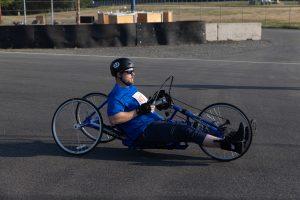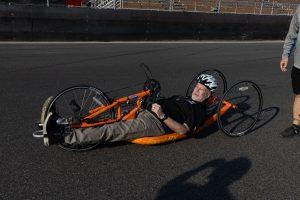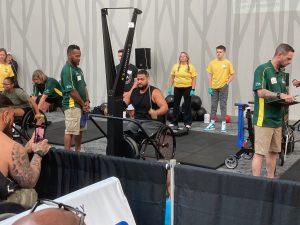NVWG Opens With Handcycling
Usually, it’s racecars speeding around the Portland International Raceway track in Portland, Ore. But on Wednesday morning, wheelchair athletes could be seen handcycling the nearly 2-mile-long race track — kicking off the first full day of National Veterans Wheelchair Games (NVWG) competition.
Yes, handcycling on the raceway.
That intrigued Marine Corps veteran Adam Cherney more than enough to try. A 30-year-old Flowery Branch, Ga., resident, he’s competed in only a couple of handcycling events before — and definitely none like this.

The NVWG race included racing around the raceway’s track, which involved straightaways and a series of tighter turns, navigating in between other handcyclists, seeing some forestry in the middle of the track and having a handful of volunteers and fans cheering him on.
It started off his first NVWG, co-sponsored by Paralyzed Veterans of America (PVA) and the Department of Veterans Affairs (VA), in a unique way.
“We have the Atlanta Motor Speedway, but I don’t think you could do this on there,” Cherney said. “This was really cool, a really cool experience.”
Overall, 23 wheelchair athletes competed in the morning’s opening 21K handcycling event. Athletes completed seven laps — or about 13 miles — of cycling under bright, sunny skies and temperatures in the mid-70s and low-80s.
A PVA Southeastern Chapter member, Cherney sustained a level T11-T12 spinal-cord injury after a fall during a training exercise in California. He loves adaptive sports, and he ended up placing first in the Novice IV-V Division to win a gold medal.
“My favorite part about it is you get that wind in your face, feel that freedom. I haven’t felt that in a long time besides doing this. It feels great,” Cherney said. “You get going, and it’s not too bad. Just focus on getting to the finish line. I focus on mixture of getting to the finish line and my breathing. It just helps me focus on something else other than what lap am I on. I didn’t want to worry about that. I just wanted to get there. Just nice and slow, breathe in, breathe out.”
Additionally, two prominent VA leaders joined the group of onlookers — as Acting VA Deputy Secretary Guy Kiyokawa and VA Assistant Under Secretary For Health For Patient Care Services/Chief Nursing Officer M. Christopher Saslo also watched the event. Saslo even tried out a handcycle off to the side of the track.

“It took me a little bit to understand the navigation, and the turn on it is not like we would have like a bike, where I could turn around on a dime. It is a much more broad turn because of the length of the vehicle itself. So, you have to really plan where you’re going to try to navigate, especially if you’re not going to be not on a straight course or in a wide turn. They have to plan a lot more proactively,” Saslo said. “The experience is extremely humbling because the things our disabled veterans go through in order to feel good about their success is pretty impressive, and it makes me very proud what our veterans do.”
Besides handcycling, wheelchair athletes also competed in air pistol, a fishing exhibition, field events, power soccer, wheelchair softball, adaptive fitness, wheelchair basketball, cornhole and esports at the Portland Convention Center on Wednesday. Competitions run through Sunday.
Athletes competing in adaptive fitness had to complete three 45-second sets of as many reps as they could on the Concept2 SkiErg, weighted core twists and lap-to-overhead dumbbell presses. They had a 10-second break in between each set.
Fidel Bobadilla, a 32-year-old Army veteran and Hanford, Calif., resident, thought it was a pretty tough workout. Bobadilla is a double above-the-knee amputee and was injured June 2, 2011, in Afghanistan after the vehicle he was riding in was hit by an improvised explosive device.

Now, he’s a WheelWOD adaptive fitness competitor and does lots of gym workouts. He said his arms were burning afterward.
“I’ve done similar stuff like that. I just don’t use the SkiErg,” Bobadilla said. “It’s supposed to target pretty much little muscles in your arms that you don’t use as often.”
But it definitely made him tired and not want to do it again for a while.
“Maybe like two months later when I kind of forget the feeling,” he said, laughing. “I almost cried during it. The third round I wanted it to be over.”